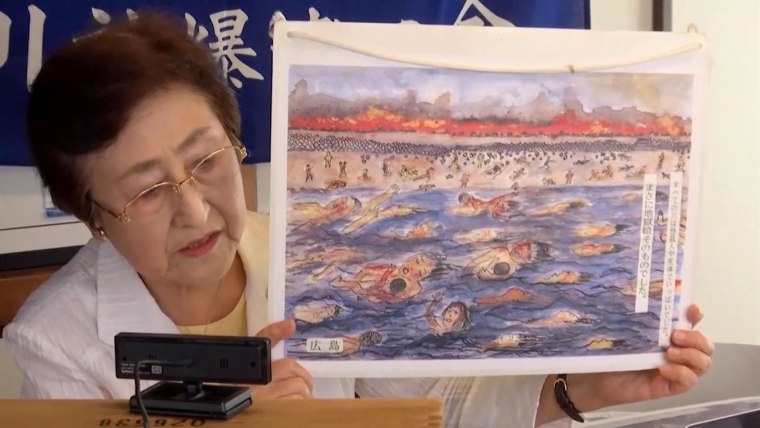Regular nosebleeds, three bouts with cancer and blinding cataracts.
It’s been 75 years since the U.S. dropped an atomic bomb on the Japanese city of Hiroshima — marking the end of World War II and the dawn of the nuclear age — but survivors like Masaaki Takano still live with the consequences.
“I'm mentally trying hard to pretend I’m OK,” Takano, 82, told NBC News by telephone from Japan in Japanese.
For decades Takano quietly lived with his ailments. He was not recognized as a “hibakusha” — a survivor of the bombing — because he was not within the immediate radius of the blast that killed an estimated 140,000 people, vaporizing them instantly or poisoning them slowly.
But last week, a Japanese court finally acknowledged that he and 83 other plaintiffs had been exposed to dangerous radiation from “black rain” — the nuclear fallout that poured from the skies in the aftermath of the explosion.
“We are doing this because we want to deliver the truth,” Takano said of the suit filed in 2015. “It’s too late to stand up after everyone dies.”
Although the case has renewed public consciousness of the bombing, and the technology that made it, some worry that the world hasn’t heeded the dangers of nuclear weapons. And today, the awesome and terrifying destructive power unleashed by “Little Boy,” as the Hiroshima bomb was known, still haunts the world in the form of vast stockpiles of nuclear weapons.
And as the aging Hibakusha die, many fear their stories will fade from the world’s memory.
‘Bigger than lightning’
Takano was at school about 12 miles from the bomb's hypocenter, or detonation point, on Aug 6, 1945. He still recalls seeing a flash “bigger than lightning” and hearing a “massive explosion — bang!”
He was sent home while debris fell from the sky. Seven years old, Takano said he tried to catch some of the objects as they showered down.
In the following days, he had a high fever and diarrhea. Although he recovered, Takano later endured many illnesses because of the exposure to radiation. He also lost his mother to cancer 19 years after the bomb dropped.
For those closer to the hypocenter, the damage came faster.
Tetsushi Yonezawa, who turns 86 on Sunday, was traveling on a busy train just 820 yards from the bomb.
Once on the military truck that rescued him and his mother, he recalls seeing people with broken bones protruding from their flesh and blood flowing from their ears.
One elderly woman “held an eyeball with her hand to avoid it falling out completely.”
The effects lingered.
“I think the next day the war ended,” Yonezawa said. “When I woke up, I saw my pillow had turned black. Looking carefully, I noticed that it was covered with my hair. I was so surprised, I touched my hair and it fell onto the sheets. I ran to my mother and she had also lost her hair. Both of us lost all our hair on the same day.”
His mother’s symptoms worsened — including bleeding gums and purple spots all over her skin. She was dead less than a month later, Yonezawa said.
“I think that the sad thing is that that legacy has died somewhat,” said Dan Smith, director of the Stockholm International Peace Research Institute. “There are now a number of developments happening in the nuclear arms field, which are seeming to receive no public attention whatsoever.”
There are an estimated 13,400 nuclear weapons in existence globally, according to the institute. The vast majority of them belong to the United States and Russia, with more than 6,000 weapons each.
Although it's far fewer than the peak of about 65,000 weapons in the 1980s — a product of the Cold War — warheads today are far more powerful.
An exchange of fewer than 1,000 nuclear weapons could kill as many as 100 million people in a matter of hours, said Daryl Kimball, executive director of the nonpartisan Arms Control Association, based in Washington.
“A nuclear war cannot be won and must never be fought,” he said. “It's in everyone's interest to reduce the risk of this ever happening.”
World - Latest - Google News
August 06, 2020 at 08:02AM
https://ift.tt/33xVFg6
Atomic bomb dropped on Japan's Hiroshima 75 years ago still reverberates - NBC News
World - Latest - Google News
https://ift.tt/2SeTG7d
https://ift.tt/35oCZy1
Bagikan Berita Ini















0 Response to "Atomic bomb dropped on Japan's Hiroshima 75 years ago still reverberates - NBC News"
Post a Comment